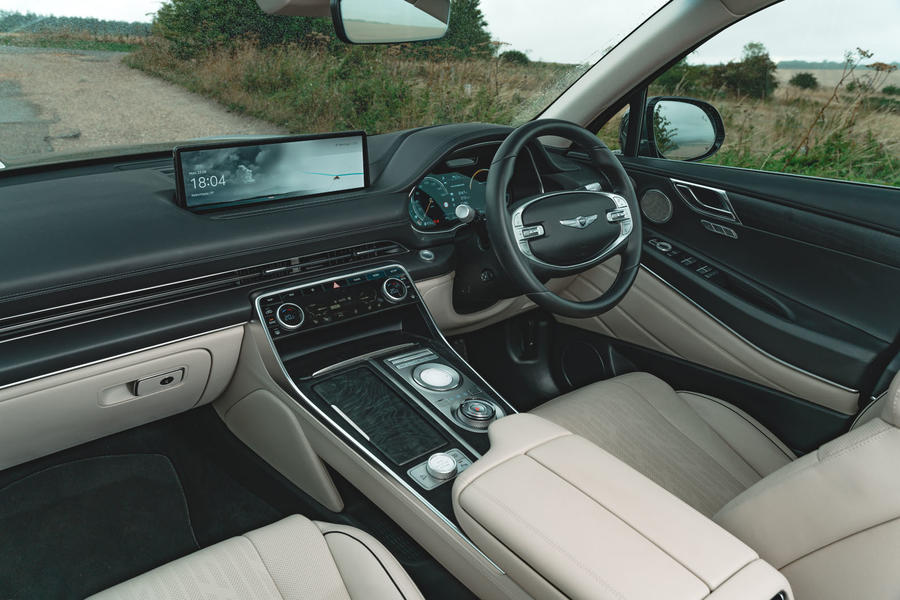Turbocharged 2.5-litre four-pot in this GV80 makes 300bhp
Four-cylinder petrol engine makes for passable performance, but real-world economy ought to be better
The nascent Genesis brand wants increasingly to look like a responsible alternative to the usual suspects in the luxury car market. That its first all-electric models are now coming through into showrooms ought to help a great deal on that score; but elsewhere it’s also omitting some more of the more powerful engines from its European showrooms that buyers elsewhere in the world can choose.
And so, if you’d prefer petrol- rather than diesel-power in your large family SUV, the Genesis GV80 offers a four-cylinder engine only. It’s a 2.5-litre turbocharged motor with both direct in multi-point fuel injection, and it makes bang-on 300bhp for this 2.1-tonne car: more than an equivalent Volvo XC90 offers, but less than most other rivals which typically use six-cylinder lumps.
The GV80 is a little bit cheaper, too, than most of those six-cylinder competitors if you buy it in entry-level ‘Premium’ trim, but we tested it in top-end ‘Luxury’ model guise. Both versions of the car run ostensibly the same rolling chassis specification – steel coil suspension with camera-controlled adaptive dampers, and rear-biased four-wheel drive with an optional electronic locking differential. But while the cheaper trims get 20in wheels as standard, the upper-level ones come on 22s.
This is a big car with quite a laid-back dynamic character. It’s lavishly roomy and generally very smooth and quiet on the move, with a richly equipped and -upholstered interior, a giant-sized steering wheel, a soft ride and fairly gentle handling responses.

Go for a top-of-the-range car with Genesis’ ‘ergo motion’ driver’s seat and you’ll get a large and comfortable chair with heating, ventilation, ‘dynamic’ (read actively adjustable) side bolstering, and multi-setting massage. The driving position is a good one, with predictably good visibility aided by the usual suite of cameras and sensors; so squeezing what is a big car into a typical UK parking bay isn’t as tricky as you might think. Space in the back, meanwhile, is very generous indeed. The second-row chairs slide fore and aft, as well as reclining and folding flat, and the boot behind them is vast.
Up front again, the GV80’s secondary controls are fairly intuitive – and overwhelmingly physical, rather than existing in the touchscreen realm. A chunky, glass-topped rotary gear selector is a reassuring presence, and there’s an equally sizable one next to it that makes scrolling around the infotainment system easy – and something you can do without taking your eyes off the road for long. Genesis’ 3D instrument mode is more gimmicky, and this tester couldn’t switch it off quickly enough. Once it is off, though, there’s nothing at all wrong with the way the GV80 conveys and displays information.
On the move, the car’s engine contributes fairly well to its relaxing vibe, but the ride associated with those 22in wheels definitely does not. Genesis’ four-cylinder petrol develops enough accessible torque to move the GV80’s mass easily in typical day-to-day traffic; and it combines well with Hyundai’s own eight-speed automatic gearbox so that, while it’s no great pleasure to rev or to listen to when working hard, you’re only exposed to any four-cylinder thrash when you need to be.
![]()
Outright accelerative urge is a little bit lacking, but in a big car like this you seldom feel like hurrying. You can, at least, get up to motorway speeds briskly enough without feeling like the car’s straining against its own kerbweight. Real-world fuel economy is perhaps the greater disappointment: drive gently while touring and you might just about see 28mpg, but 24- is probably the more typical daily average.
Whether you drive it gently or otherwise, however, this car’s ride on those 22in wheels can vary from quiet and settled to become suddenly quite jarring when you hit broken asphalt. Genesis makes some big claims about this car’s refinement; and it’s certainly supple and agreeable when the surface suits it. But the company really must do a better job of the GV80’s secondary ride isolation in order to justify those claims.
As it is, only those content to buy at the cheaper end of the showroom range stand to get the truly relaxing car they’ve been promised. If you’re buying a GV80, then, be brave enough to stick with diesel power and lower-level trim, accepting whatever equipment compromises come along with the decision.
Source: Autocar